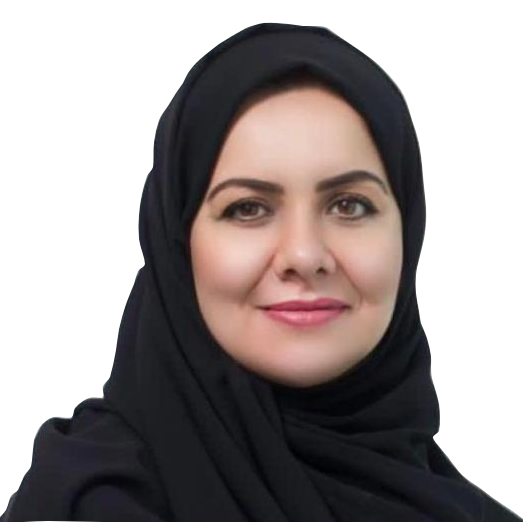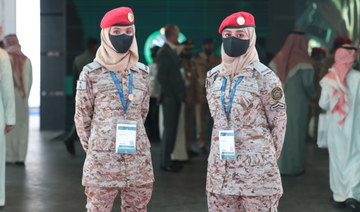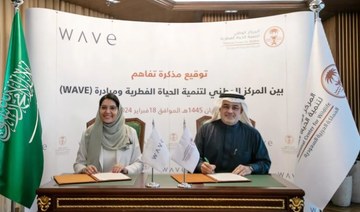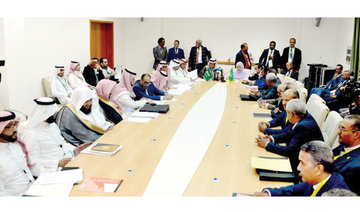RIYADH: Women’s empowerment in the Saudi labor market is gathering pace with the ambitious aim of increasing the female contribution to the Kingdom’s overall economy to 28 percent.
The Shoura Council has enacted a number of laws and proposed amendments to other regulations in order to protect women’s rights, including initiatives to reduce unemployment, as well as increase female representation in positions of authority and decision-making.
Legislative efforts are expected to broaden employment opportunities, paving the way for women to work in different sectors.

Dr. Hala Al-Tuwaijri, Secretary General of the Family Affairs Council. (Supplied)
The objective is also to lift women’s participation in the labor force from 22 percent to 30 percent by 2030, as well as strengthen female economic involvement by encouraging remote and flexible work.
SPEEDREAD
• Legislative efforts are expected to broaden employment opportunities, paving the way for women to work in different sectors.
• The objective is to lift women’s participation in the labor force from 22 percent to 30 percent by 2030, as well as strengthen female economic involvement by encouraging remote and flexible work.
• Other goals include leadership guidance for female cadres, programs to support daycare centers, training to help women meet labor market requirements, and the improvement of job creation mechanisms.
Other goals include leadership guidance for female cadres, programs to support daycare centers, training to help women meet labor market requirements, and the improvement of job creation mechanisms.
Hala Al-Tuwaijri, secretary general of the Family Affairs Council, told Arab News that “accurate indicators” based on labor market data will help empower women economically and enhance productivity.
The Kingdom has increasing women’s workforce participation as part of its Vision 2030 reform targets, she said.
Legislative changes also have a positive impact on the Kingdom’s international indicators, and “this supports the continuation of resolutions, the launch of programs, and future plans and solutions to support the empowerment of women to access opportunities and services.”
She said that women’s economic empowerment will boost productivity, and contribute to greater economic diversification and income equity, as well as assist positive development outcomes and growth in gross domestic product.
Companies and institutions benefit from increasing employment opportunities and women’s access to leadership positions, enhancing the efficiency of the organization. As a result, according to Al-Tuwaijri, the Kingdom has paid special attention to women’s strong and active participation in social and economic development.
She said that an integrated system for empowering women in the labor market should be provided. Economic progress and encouragement of women to enter the labor market can help balance women’s lives and enhance their role in the family.
“A family-friendly work environment should be created through, but not limited to, various labor policies and patterns such as flexible work policies, part-time work, the provision of soft loans to women entrepreneurs,” Al-Tuwaijri said.
“It is important to support policies, programs, and initiatives that assist women in meeting the challenges of the labor market and that are provided by the Kingdom to facilitate women’s access to and promotion of entry into the labor market.”
Other experts also shared their views about women joining the labor market in Saudi Arabia.
Gareebah Al-Twaiher, supervisor of the Department of Female Students at Arab East Colleges, said that government resolutions in support of women had enabled them to become an effective player and partner in the region’s comprehensive and sustainable development.
These resolutions view women as strategic partners in driving comprehensive and sustainable economy across the country, she added.
Al-Twaiher, who also chairs the Future Women Society,) said: “Indicators are an important scientific tool for monitoring women’s participation in development and measuring progress toward Vision 2030 targets, and the Kingdom’s overall trends toward achieving women-related sustainable development goals, which will have a positive impact on women’s economic empowerment to participate in regional development.”
She said that for decision-makers and market policymakers, “accurate indicators” based on labor market data are critical.
“It assists in diagnosing challenges and assessing the current situation by understanding the structure of the current market, understanding the demographics of the labor market, identifying the main indicators of the market, in general, and of women in particular, and contributing to the Kingdom’s progress in global indicators, thereby supporting and strengthening efforts to improve the mental image of Saudi women.”
Al-Twaiher, who recently finished a joint study on “The Impact of Artificial Intelligence and Automation on Future Jobs in Saudi Arabia,” highlighted the importance of “carefully selecting qualified people and enabling women to develop their skills for future jobs by providing incentives that encourage them, enhance their technical capabilities, and increase their share in leadership positions.”
Saudi journalist Sukina Bu Haliqa believes that woman’s presence in the labor market has been modest and restricted to roles such as receptionists, cashiers and saleswomen, “but we haven’t seen women in executive positions or other senior positions.”
She hopes the rate of women’s participation in the labor market will rise, but said that “a lot is needed to achieve that.”
Bu Haliqa added that women’s independence in obtaining employment, including the ability to drive and choose whether to work, will have a host of implications for the national economy.
Independence will help women work in schools, nurseries and restaurants, for example, and increase their purchasing power, demand for basic services, and consumption of fuel and perfumes, for example — all of which have an impact on local economies.
Huda Al-Rasheedy, a specialist in scientific research, said that Saudi women’s empowerment has accelerated as a result of legislation to strengthen their position in society.
“They have become an effective partner in national development in all fields: Economic, social, scientific, cultural and others. Many decisions have been made that demonstrate the leadership’s faith in women and support their endeavors to hold leadership positions.”
According to Al-Rasheedy, author of “Innovation in Universities,” women are a major component of the Kingdom’s human capital, and constitute an important part of the economic value of human resources.
“Their integration and cohesion, as well as the effective investment of their skills and capabilities, are the basis for the demographic reconfiguration that achieves growth.
“The economy, as well as the belief in women’s pivotal role as a cornerstone in the development process and a flourishing economy, provided the Kingdom’s Vision 2030 with a great opportunity for their participation and enhancing their value in society,” she said.






























